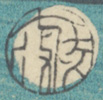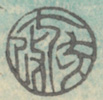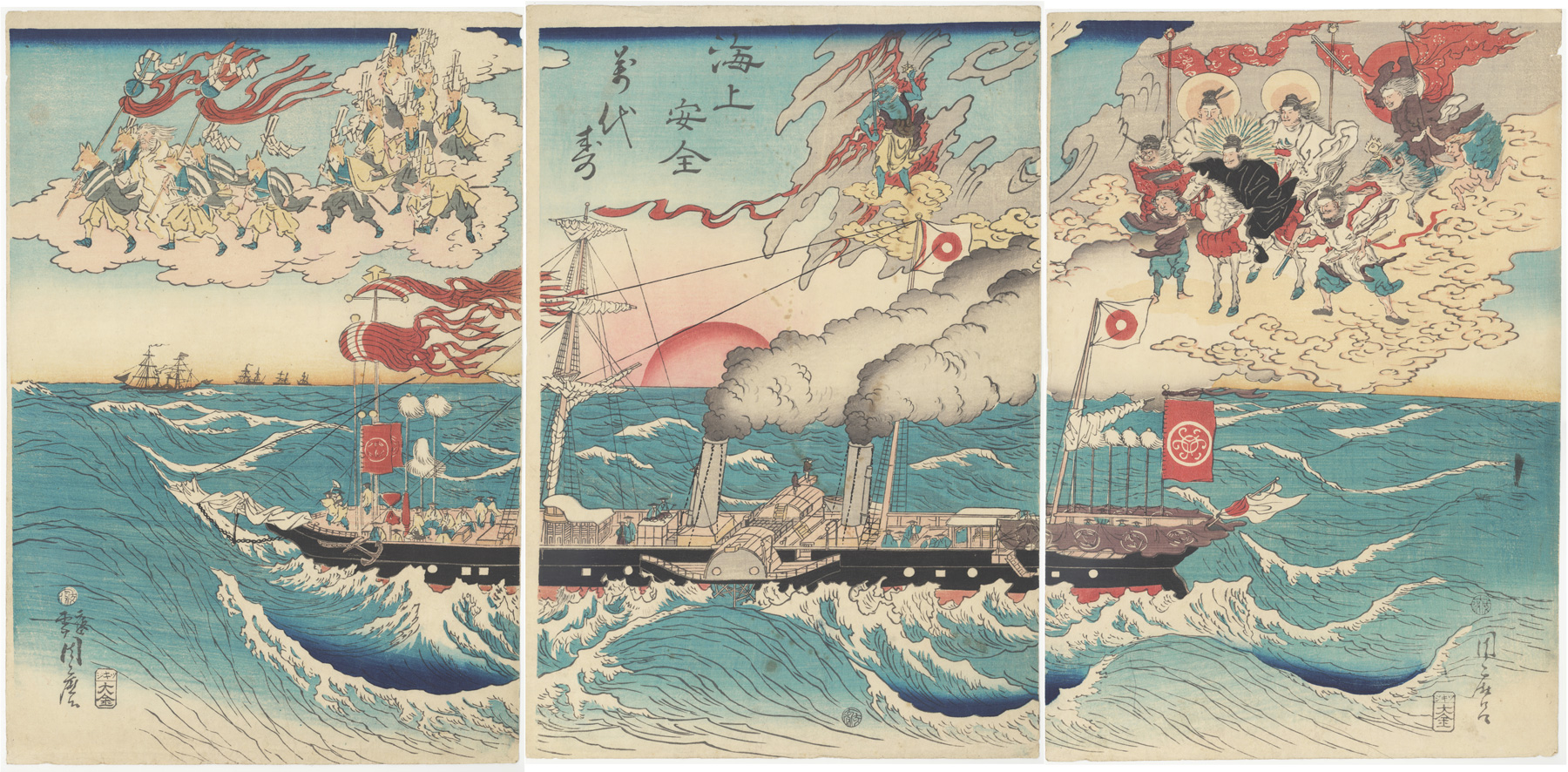About This Print
This print depicts the return of Shogun Iemochi to Edo from Kyoto on the battleship Jundō-maru which is being protected by various deities.Source: Demon of Painting: the Art of Kawanabe Kyōsai, Timothy Clark, British Museum Press, 1993, p. 114
In the spring of 1863, Shogun Iemochi (ruled 1858–66) was ordered to Kyoto to confer with the court on how and when the ‘foreign barbarians’ should be expelled from the country. This was the first time in more than 100 years that the shogun had been summoned by the court in this way and was a high point of influence of the ‘revere the Emperor, expel the barbarians’ (sonnō jōi) faction. Iemochi left Edo with a huge retinue on the thirteenth day of the second month, and arrived at Nijō Castle in Kyoto on the fourth day of the following month.
Kyōsai, like most inhabitants of Edo, would have wished the shogun success in his political mission, upon which rested the future economic prosperity of the city. In the seventh month, 1863, he designed a triptych showing deities protecting the return of the Shogun to Edo in the battleship Jundō-maru1, an event that had occurred the previous month.
1 The Jundō-maru was a 360-horsepower ironclad paddle steamer, built in Britain, and purchased by the Bakufu for $150,000. [Source: Samurai Revolution: The Dawn of Modern Japan Seen Through the Eyes of the Shogun's Last Samurai, Romulus Hillsborough, Rutland and Tuttle Publishing, 2014, p. 218.]
Commemorating the Occasion
Source: "Kawanabe Kyosai and Toyohara Kunichika," by Shigeru Oikawa appearing in Time Present and Time Past: Images of a Forgotten Master: Toyohara Kunichika (1835-1900), by Amy Reigle Newland, Hotei Publishing, 1999, p. 39.
While this print depicts the return of the Shogun from Kyoto back to Edo after his meeting with Emperor Komei (1831-1867), it was the Shogun's trip to Kyoto that was most portrayed in woodblock prints. At least thirteen artists, including Kyosai, were commissioned by approximately sixteen publishers to design prints commemorating the occasion. Kyosai alone designed twenty-eight prints for the series.
Print Details
| IHL Catalog | #212 | ||
| Title or Description | Congratulations on Maritime Security for All Eternity!1 海上安全万代寿 or 海上安全萬代寿 (Kaijō anzen bandai kotobuki) Note: translated as Safety at Sea, Blessings for 10,000 Generations by The British Museum | ||
| Artist | Kawanabe Kyōsai (1831-1889) | ||
| Signature |
| ||
| Seal of the Artist | no seal | ||
| Publication Date | 1863 (Bunkyū 3), 7th month 文久3年7月    Censor's Seal aratame, i, shichi 亥七改 [Boar 7] | ||
| Publisher |   Daikokuya Kinnosuke 大黒屋金之助 [Marks: seal ref. 24-002; pub. ref. 033] seal reading Tsukiji, Daikin ツキヂ 大金 | ||
| Carver | |||
| Printer | |||
| Impression | excellent | ||
| Colors | excellent | ||
| Condition | good - full size separate sheets; unbacked; minor wrinkling throughout; some staing on center sheet and right portion of right sheet | ||
| Genre | ukiyo-e | ||
| Miscellaneous | |||
| Format | vertical oban triptych | ||
| H x W Paper | 14 x 9 3/8 in. (35.6 x 23.8 cm) each sheet | ||
| H x W Image | |||
| Collections This Print | Museum of Fine Arts, Boston 11.36777a-c; Waseda University Request Number:chi5 3975; The British Museum 1907,0531,0.642.1-3; The Tsubouchi Memorial Theatre Museum of Waseda University 201-1868, 1869, 1870; Smithsonian Institution Freer Sackler Gallery S2003.8.485; National Diet Library 寄別8-4-1-4; Tokyo Museum Collection 92200026-92200028; Mie Prefectural Museum JR0000243; Museum Volkenkunde, Leiden RV-2493-11, 11a, 11b | ||
| Reference Literature | Demon of Painting: the Art of Kawanabe Kyōsai, Timothy Clark, British Museum Press, 1993, p. 114, fig. 73.1 |
1English title supplied by Quintana Heathman, Research Assistant for Japanese Print Exhibitions Museum of Fine Arts, Boston
Latest revision:
5/22/2021
8/20/2018




